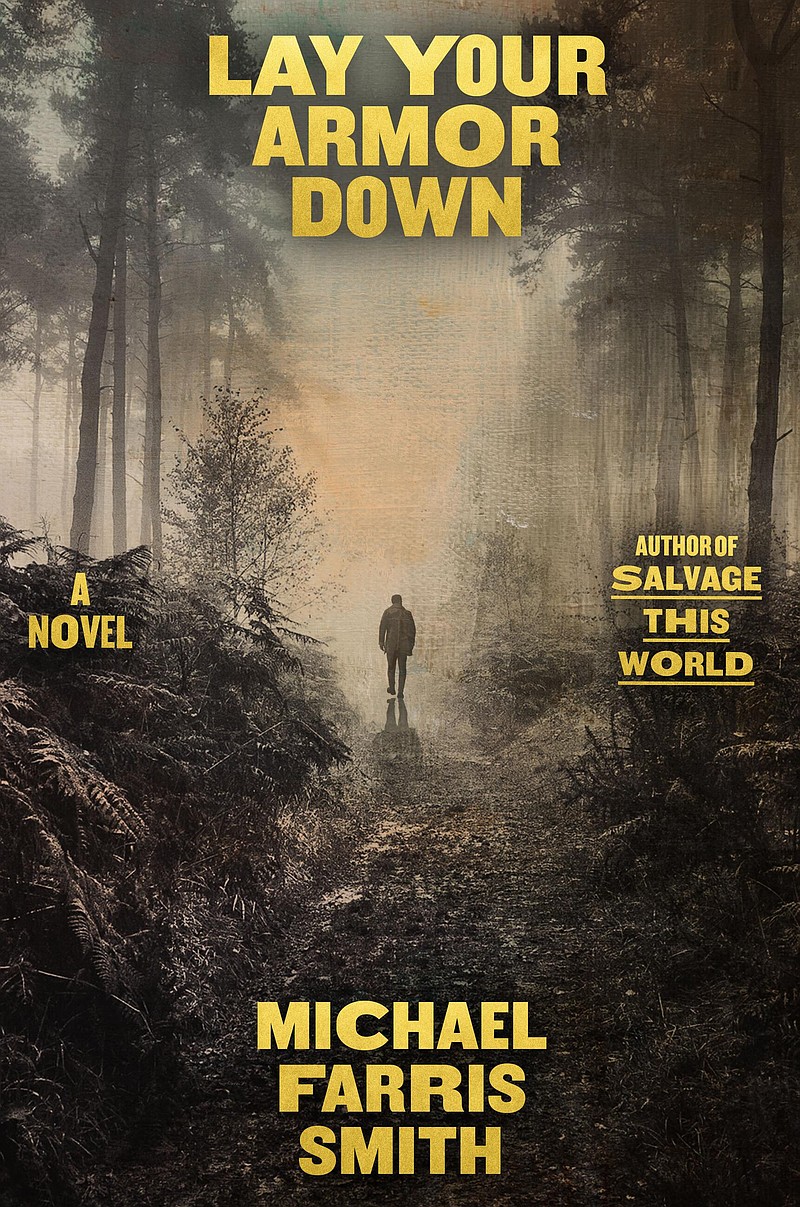“LAY YOUR ARMOR DOWN” by Michael Farris Smith (Little, Brown and Co., 272 pages, $29).
Michael Farris Smith sets his novels in southern Mississippi, but not the one you’re familiar with from maps and GPS. His world, devoid of place names and temporal markers, exists in close proximity to the demon realm. His new novel, “Lay Your Armor Down,” opens with an old woman wandering through darkened trees, her mind unmoored, leaving her “a shapeless spirit of the wood that drifted timelessly.” Nearby swampland “slurped up against the roadside as if only waiting for the command from some weather god to swallow what was left of the raised earth.” The boundary between worldly and otherworldly fluctuates; death and its minions muster in neighboring fields.
Smith’s characters, sensing the presence of infernal agents, cling to vestiges of human civilization. They eat in diners where ’50s décor isn’t retro-chic and stay at a hotel whose heyday coincided with the advent of railroads. They meet at a cinderblock bar whose spartan furnishings include folding chairs and “a makeshift bar made out of bowed plywood,” the whole place “soursmelling and soaked in dread.” Only a mortal fear of death’s undiscovered country, and a stubborn habit of living, keeps these people from cashing in early.
The action revolves around two small-time hoodlums, Burdean and Keal, criminals with a generation between them: “The older one [Burdean] with the white in his beard and the ridges around his eyes and the younger one [Keal] with the look of the lost and the lazy curl in the length of his hair and the age that seemed to be rushing on him at this very minute.”
They have accepted a mysterious job, to retrieve an unspecified package out of the cellar of an abandoned church. When they arrive, they are confronted by a scene of carnage, dead bodies strewn about in Cormac McCarthyesque abundance. In the cellar, they discover not money or drugs, but a dark-haired girl, maybe 9. For lack of any better idea, Burdean and Keal take the girl with them. Soon they are joined by a woman, Cara, who isn’t sure if the girl needs to be protected by the men or from them. This unlikely quartet goes into hiding, not knowing who’s pursuing them or what makes the girl murder-valuable.
Like Smith’s previous work, notably “Blackwood” and “Salvage the World,” the new novel moves fast and revs like a GTO in second gear. Smith’s sentences participate in the sensory overload they describe, moving briskly from image to image until the whole scene is vibrantly realized. Walking in the woods at night, Keal comes across a wolf, “a pair of bluewhite eyes staring at him,” and hopes that its recent prey — “a length of black lay at its feet” — is not the old women he has seen earlier. The eloquent sentences, combined with short chapters, make this novel a brisk read, one that rewards flipping back pages to re-experience key moments.
“Lay Your Armor Down” entertains with its tension and pace; it instructs, as well, with moments of dark wisdom, much of it dispensed by Burdean. When Keal declares that he’s finished with gunfights, his older partner cautions him, “If I was you I wouldn’t get in the habit of declaring what you will and won’t do before it happens.” Trying to keep the girl from harm, Burdean learns that there’s no escaping violence or guilt: “The truth about the world is that everything is possible and you are a part of that now. You have become a part of the hand of God. And the hand of God is soaked in blood.”
In this ominous atmosphere, Keal and Cara form a bond, primarily in their determination to protect the girl and also in their shared history of insomnia. They have trained themselves to avoid deep sleep because they fear their dreams, which they believe convey premonitions of misfortune. Cara wakes with a start when she dreams about the old woman, her distant neighbor, stumbling into wooded danger. Keal shares that he’s been plagued by dream prophecy since his mother died, when he was 18. Smith describes one of Keal’s dreams, about a lightning storm, in such harrowing detail that we assume it foreshadows doom. Given the grim realities of Smith’s world, these premonitions might not be supernatural, but simply a matter of subconscious pattern recognition. If events appear momentarily promising, you can be certain that calamity is right around the corner.
In Burdean and Keal, Smith has created protagonists who aren’t noble enough to qualify as antiheroes. The novel’s morality scale tips decisively toward the transgressive: pure evil definitely exists, whereas goodness survives only where it’s deeply alloyed with sin. Still, they make progress, these unlikely knights errant. “I’m the good guy,” Keal insists, genuinely wanting to believe it. Burdean, too, in quiet moments reckons his guilt and prepares for his ultimate trial.
For more local book coverage, visit Chapter16.org, an online publication of Humanities Tennessee.
 Little, Brown & Co. / Lay Your Armor Down”
Little, Brown & Co. / Lay Your Armor Down”

